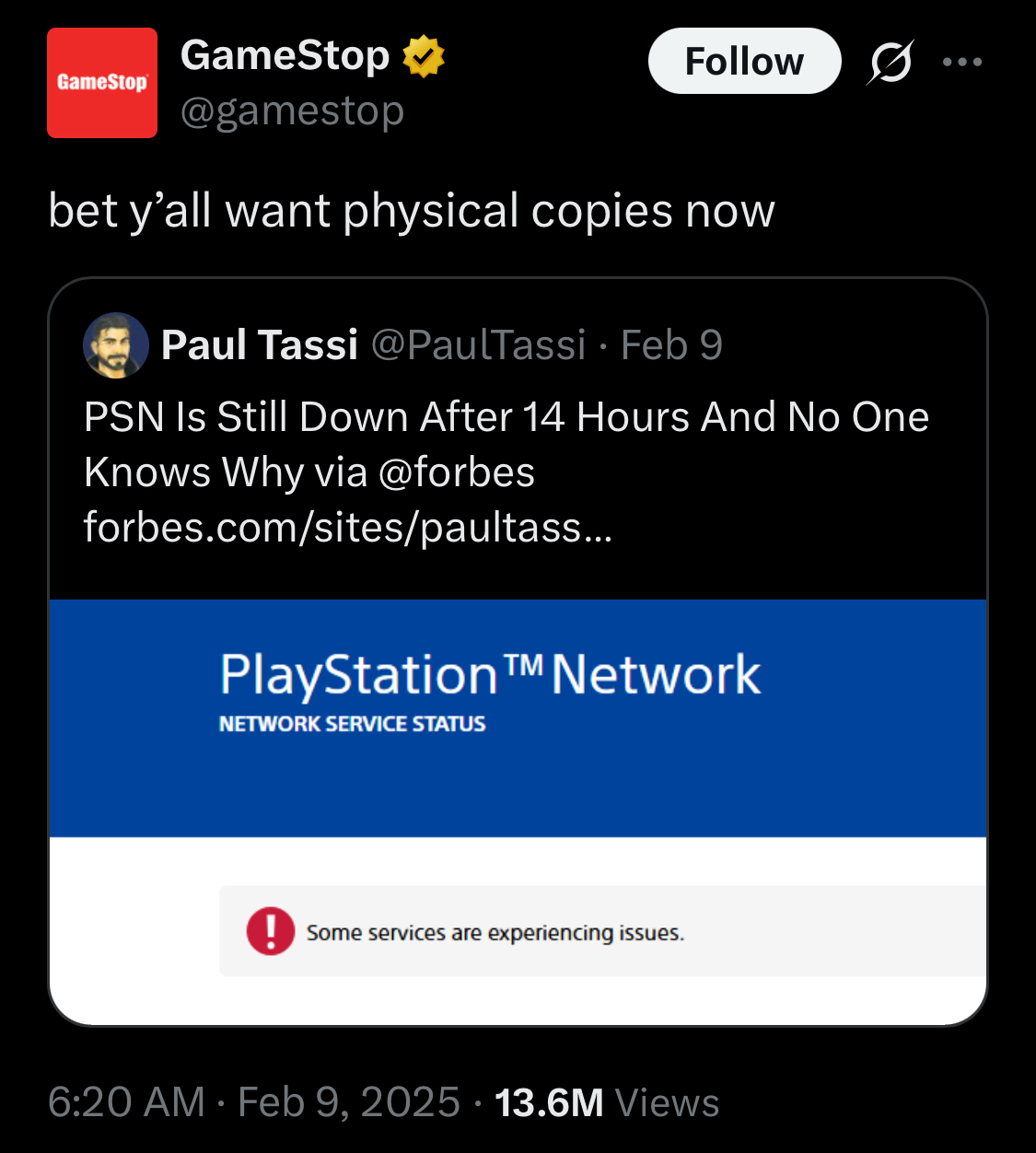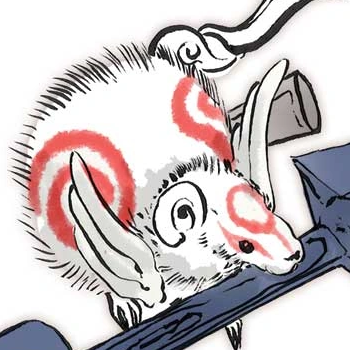Nightdive Studios, The Strong Museum, and the Videogame Heritage Society discuss how to preserve games in the digital age
“Game-Key Cards” so it’s a licensing dongle with a fancy name and peculiar shape.
Just to respond to the people here resigned to or encouraging the switch to all-digital, I get it. But let me rage against the dying of the light just a bit. There are some still-good reasons for preferring or demanding full-game cards:
- Having a complete release-date-version game on a cartridge, even if it is later (or instantly) patched, is typically 99% percent of the game experience. Yes, there will be fixes and DLC and so on. But in a preservation discussion, looking to 50 years from now, having preserved 99% of the experience versus 0%, the gameplay, the complete original graphics, the original sound, is still functionally the difference between a game being preserved or not.
- Hacking the Switch 2 will be required to independently preserve key-card or digital-only games. Full stop. Hackers have been to some extent been our preservationists since the dawn of DRM, but in the world of game-key-cards that Nintendo has chosen to accelerate, they will be the only preservationists. I have no issue with hacking, but it’s unreliable and eventually may stop being viable when hardware DRM and TPM-style modules are part of the core chip design. Our preservation future is a gamble that hackers will continue to defeat DRM.
- The only preservation alternative is to have era-complete sets of games on physical Switch 2s, which will eventually break down. Repairs will require, again, hacking, because hardware DRM already will never make repairs simple again. The game working on one system, versus 100 million (or whatever Switch 2 will sell) is the difference between it being playable for entire generations of people or not, even if the game is never hacked and dumped.
- Digital-only experiences are not incompatible with game preservation. GOG is the model here. Nintendo is not acting in the only way feasible, they’re acting according to a specific corporate business plan that seeks to enforce scarcity and capitalize on long-term capture of any resale markets.
- Yes, competitors are already doing digital-only, DRM-locked distribution. But resigning to this because of that is an all-or-nothing fallacy. Every bit we can preserve helps.
Closing more philosophically: Games are shared culture. When you grow up with a game, or as an adult have a profound experience, that game becomes a part of you. At a societal level, that game becomes a part of us and of human culture - at that point it doesn’t even “belong” to Nintendo exclusively.
Nintendo (not only, but focusing on them here) is choosing a path where there will be no alternative to re-paying to experience that memory throughout your life. SaaS is capitalism’s most tragic 2000-era “innovation” - tether us to a subscription for our whole lives, if possible, extracting value - and Nintendo already has shown they will lock old games behind their subscription service rather than re-release them. Experiencing these games through museums 50 years from now may only be at corporate behest (if Nintendo still exists, which is less sure than it may feel in this moment).
So this may seem “duh, they’re doing what everyone else is.” But it is actually a bellwether moment. The future we’re pointed, that we enable by treating these key-cards as viable, is re-purchasing or subscribing to access basic parts of ourselves and our culture, even after we’ve paid for it.
And to respond to the “but it’s Nintendo’s property” crowd: That is also actually antithetical to modern copyright law, which is vehemently not an inviolable property grant, but meant (since the Statute of Anne) to only give incentive to make more expression. Broader public good and culture is always the end-game of copyright. These works eventually are supposed to belong to us. These game key-cards are just one step in capturing that long-tail - the long-tail that belonged to preservationists, to museums, and to the public - from us all.
I’m also tired of hearing about disc rot. The vast majority of people just repeat it like a meme and have never experienced it first hand. It affected a fraction of CDs and a much smaller fraction of DVDs. Blu-rays will outlive you. Most “rot” is the result of manufacturing defects where the glue layer separates, and they recognized this after CDs and made significant improvements with each subsequent disc generation.
Also, nearly 90% of physical games do not require a download to play and complete.
None of this is to say you shouldn’t enjoy digital games or rip your media. I just want people to stop unintentionally spreading misinformation.
👏👏👏👏👏👏
I used to buy physical as much as I could, but nowadays it doesn’t mean anything, so I don’t care as much about it.
Flash memory cartridges die, even faster in cases of bad batches. Optical discs have disc rot (again, some worse than others). Many many games have updates, DLCs or patches that won’t be on the physical medium. Plenty of games coming on discs have to be fully installed on the machine’s drive anyway because disc drives are too slow.
Most indie games, including some of the best experiences out there, never get physical versions, or only very limited ones.
The only way to preserve is to duplicate and archive everything, even if it’s not easy. Keeping original physical media as a souvenir is nice, but it doesn’t achieve long term preservation.
I am 100% with you on this one.
I was against DLCs and digital games when they first came up with the PS360 generation. But physical games are generally incomplete, the boxes and support aren’t appealing to me anymore (removing the booklet was exactly when I gave up). You are not even playing from the discs anymore, all disc games are « game key cards » once your game is installed.
I went 100% digital since the Switch, much easier to handle and preserve, much more compact than stacking DVD boxes.
It was already an issue on Switch for some games. They just clarified when games are not complete, provided cheap carts for such games to reduce the cost. It’s not Nintendo’s fault if most editors are doing this. Nintendo is not doing it (at least for now). But as soon as you need a patch or a DLC, your physical games will be incomplete anyway.
Just one thing to note, that the difference between copying all data to disc vs downloading is of requiring internet. There are still many places in the world where requiring internet access, specially for big downloads can be an issue.
Other than that, I agree with you. And for people with good internet connection, that difference doesn’t matter anyway, both are similar for them.
Nintendo did it on at least one occasion, not counting games with big DLC that of course aren’t on the cartridge.
Bayonetta 2 came with 1 on Switch, but only 2 is on the cartridge, 1 is a download code.
Bayonetta 1 got a (limited?) physical release alongside 3.
Apparently so. Doesn’t change that 1+2 still had only half of its content on its cartridge.
Though they’d need a 32GB cart to put them on a single cartridge, and apparently those were used for like 12 games total. So maybe it would have been cheaper with 2 16GB. After all, the Wii U version of this pack had a physical disc for each game.
Despite their short lifespan, those forms of media were at least still rippable and enjoyable beyond the life of when the parent company says “you can’t enjoy this anymore!”
The memory of your console is rippable too. they might try to make it more difficult (and fuck that) but I’m sure someone will always be able to get those files one way or another.

If your digital game was installed, it worked perfectly during the outage.
But yes, if you wanted to play any other game from your library, that wasn’t installed, digital won’t work, but physical would have worked.
I can see both side of the arguments.
Many games are releasing with just a code in a physical box, which among other issues means people can’t resell those, with Game-key cards, at least people can resell these, and the next person can download the game too.
On the other hand, it is kind of officially sanctioning this practice of not releasing a full game on a cartridge, which can lead more companies to follow this example.
I guess it’s upto end users now, to vote with their wallet and let the companies know that they won’t buy these.
What are the other options that still release full games on a disc/cartridge? Sony and Microsoft already went “Download Discs” a long while ago. The Nintendo and the Switch 1 was the last hold out, and even some of its bigger games were eshop only. I keep having to look to third parties, like limitedrungames.com, to get physical editions, or having to import from a country where it did get a physical release.
There are still some games companies that release full games on disc, like Cyberpunk 2077 releasing full game on cartridge for Switch 2. There are other examples too, but they are getting less and less.
Oh that’s the funny part. Cyberpunk and the DLC, on a cartridge. Bravely Default, a DS game, download cart. It’s silly.
limitedrun.com is some other random website.
I fixed that. Thank you.
I do wonder what console manufacturers will do in order to keep at least some all-physical releases around as game sizes grow. Blu Ray has topped out at 128GB on the highest end discs, and flash storage isn’t dropping in price as quick as before for making larger cartridges. Maybe we will see more cases like Mario Kart World where the physical version is more expensive? However, I do think there might be less key card games as Switch 2 goes on, as likely a big motivation for key cards at launch is the current low production volume and high price of SD Express cards (which the cartridges are based on). Shelf space and shipping are a considerable cost to publishers, so they would have some motivation to avoid any costs related to the eShop hosting if possible.
It kinda sucks how hard it is now to share a game with a friend. That was one of the main draws of console gaming for me; how you’d have ownership of the game to do with as you wished. PC gaming switched to predominately digital downloads years back, which is fine when you consider how affordable those games eventually become during Steam sales. But first party Nintendo games seem to hold their value and the sales are never that great, so you’re left with more expensive games and no longer the option to share them.
Well, what little interest I had in buying as Switch 2 is now totally gone.









